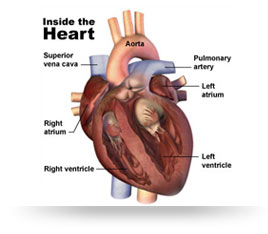
Congestive heart failure (CHF), or heart failure, is a condition in which the heart can't pump enough blood to the body's other organs. This can result from
- Narrowed arteries that supply blood to the heart muscle — coronary artery disease
- Past heart attack, or myocardial infarction, with scar tissue that interferes with the heart muscle's normal work
- High blood pressure
- Heart valve disease due to past rheumatic fever or other causes
- Primary disease of the heart muscle itself, called cardiomyopathy.
- Heart defects present at birth — congenital heart defects.
- Infection of the heart valves and/or heart muscle itself — endocarditis and/or myocarditis
The "failing" heart keeps working but not as efficiently as it should. People with heart failure can't exert themselves because they become short of breath and tired.
As blood flow out of the heart slows, blood returning to the heart through the veins backs up, causing congestion in the tissues. Often swelling (edema) results. Most often there's swelling in the legs and ankles, but it can happen in other parts of the body, too. Sometimes fluid collects in the lungs and interferes with breathing, causing shortness of breath, especially when a person is lying down.
Heart failure also affects the kidneys' ability to dispose of sodium and water. The retained water increases the edema.
Heart failure is a chronic, long-term condition, although it can sometimes develop suddenly.
The condition may affect only the right side or only the left side of the heart. These are called right-sided heart failure or left-sided heart failure. More often, both sides of the heart are involved.
Heart failure is present when the following changes are present:
- Your heart muscle cannot pump, or eject, the blood out of the heart very well. This is called systolic heart failure.
- Your heart muscles are stiff and do not fill up with blood easily. This is called diastolic heart failure.
Both of these problems mean the heart is no longer able to pump enough oxygen-rich blood out to the rest of your body, especially when you exercise or are active.
As the heart's pumping action is lost, blood may back up in other areas of the body, causing fluid to build up in the lungs, the liver, the gastrointestinal tract, and the arms and legs. As a result, there is a lack of oxygen and nutrition to organs, which damages them and reduces their ability to work properly.
Perhaps the most common cause of heart failure is coronary artery disease (CAD), a narrowing of the small blood vessels that supply blood and oxygen to the heart. For information on this condition and its risk factors, see: Coronary artery disease.
Heart failure can also occur when an infection weakens the heart muscle. Such a disorder is called cardiomyopathy. There are many different types. For more information,
See: Cardiomyopathy
Other heart problems that may cause heart failure are:
- Congenital heart disease
- Heart attack
- Heart valve disease
- Some types of abnormal heart rhythms (arrhythmias)
Diseases such as emphysema, severe anemia, hyperthyroidism, or hypothyroidism may also cause or contribute to heart failure.

